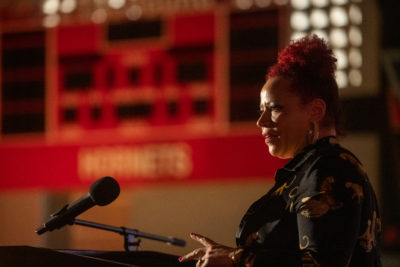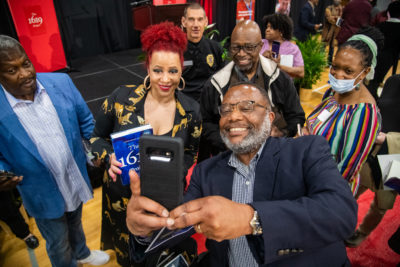Stitching together snapshots from 400 years’ worth of racist systems in America was no mean feat for “The 1619 Project,” but the resulting cultural and political tsunami it’s led to in the three years since its release has felt just as significant.
Pulitzer Prize-winning journalist Nikole Hannah-Jones, lead author of the project, spoke to the weight of that backlash and the accompanying “fight for democracy” in the 2022 Schewel Lecture before a crowd of over 1,000 people gathered in Turner Gymnasium Thursday evening.

“It is impossible for a work of journalism to ‘threaten the integrity’ of the United States of America,” she said, referencing accusations from both successful and unsuccessful bans of her work on national, state, and local levels.
“That we could be so fragile that a work of journalism that simply seeks to tell the truth of our founding could destroy our country — I don’t believe that.”
Collecting writings from a variety of authors and scholars, The 1619 Project rejects the teaching of slavery as an “asterisk to the American story,” Hannah-Jones summarized for the audience, and aims to create a better understanding of the nation’s identity.
“What this project sought to do was to center slavery as a quintessential American institution, [with] Black Americans as key contributors to the American story,” she said. “It’s really argued that America as we know it would not exist without the contributions of Black Americans — and our most critical contribution being democracy itself.”
Prompting frequent bouts of applause and laughter, Hannah-Jones mounted a playful yet potent counteroffensive in the lecture, which was free, open to the public, and followed by a Q&A session.
She traced the project’s place among the growth of the Black Lives Matter movement after “George Floyd was lynched on national television,” and the emergence of Critical Race Theory as a political rallying point borne of a “very successful propaganda campaign.”
“1619” became a tag for protesting structural racism, perceptions of which were divided along partisan lines, Hannah-Jones pointed out. And the stoking of “white anxiety,” she added — over declining demographics and declining societal power — has given rise to a flurry of bills and resolutions that are “anti-CRT.”
A more apt term for that, Hannah-Jones said, is “anti-history.”
“We target history because how we teach history is how we think about ourselves as a country,” she said. “… History is about our collective memory. How do we think about our society? How do we understand who we are?”
When that understanding includes exposing how power has been obtained, she continued, it leads to a drive to undo systems that have propagated inequality.
Banning, or trying to ban, “The 1619 Project” was merely a test run for broader moves against the rights of marginalized people, Hannah-Jones said, displaying recent headlines depicting those moves throughout her lecture.
“If this were happening in Cuba, if this were happening in Saudi Arabia or China, where the government was saying, ‘If you are teaching this journalism that we don’t think paints our country in a good enough light, then we are going to make that illegal or prohibit that,’ we would know what to call that,” she said.
“And yet, somehow, we accepted that in the United States. And so of course trouble was to come from that.”
That trouble, according to alarms rung by a cadre of scholars, has been an ongoing assault on democracy itself, she said.
Many of the 36 states introducing or passing “anti-history laws” are also riding the landslide to introduce bills limiting reproductive rights, voting rights, and rights of LGBTQ people.

“All of these rights are connected,” Hannah-Jones said. “So that’s why we can’t just be worried when we think it affects us personally, because they’re going to come for you.”
Several questions posited to Hannah-Jones after her lecture wondered what professions and agencies can do to bolster equity within their institutions. She playfully reminded the audience that she’s just the messenger, and that change depends on those making decisions from positions of power.
“There is collective power in this room, there is collective power in this community if we say that we refuse to be the country of our past, that we are going to work together to become the country of our highest ideals,” she said.
Having accepted a teaching position at Howard University last year, she also spoke to the important roles of educators during a time that “requires great courage” as teachers increasingly find themselves under attack.
“All I say to y’all is: Your work does matter in ways big and small, and I’m just grateful for you and I’m grateful for the courage of educators … every single day.”

